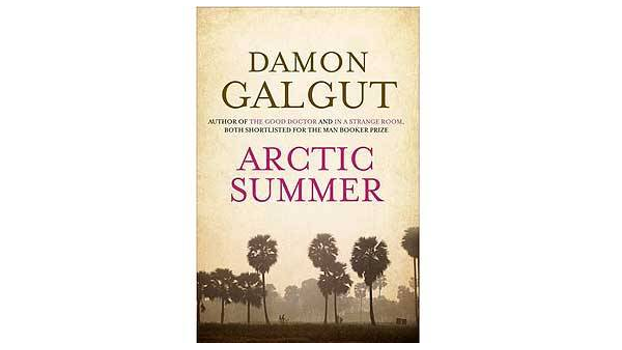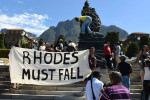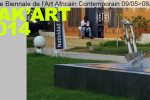
Edwin Morgan Forster’s A Passage to India haunts writers with the implications of what can be achieved by what is not said. Damon Galgut ventures into this territory with his new novel Arctic Summer, writing the eleven-year gap between Forster’s first trip to India, up to the months just after the novel was finally published. What happens when a 21st century South African writer imagines a canonical English writer’s life? An important double vision is articulated, one that looks forward through the lens of race and colonisation to a time already past. India stands at the centre: the vast unknowable heart of a certain kind of darkness both Forster and Galgut want to explore.
Arctic Summer stands apart from fiction that either speaks back to empire or belongs to its ideology, in a third space all of its own. It offers the colonial written by the postcolonial: a writer imagines the writing process of something already written. Forster’s novel is dedicated to Syed Ross Masood, the Indian Muslim who was his lifelong friend, and with whom Forster fell painfully in love. Galgut is a frequent visitor to India and his own book is dedicated, in language that mimics and echoes Forster’s, to his friend Riyaz Ahmed Mir. Is Galgut’s Arctic Summer homage, appropriation, or simply an evocation of a writing life? Is it a biography or a travelogue? Reading it one experiences a certain kind of vertigo, as when cave paintings are illuminated by flashes of electric light, and the ghosts of centuries past seem to speak.
Arctic Summer is a novel that looks both ways – to its past and future – even while it postdates and pre-empts some formative tropes of postcolonial thinking. Mimicry forms a chain of echoes through it. The title is taken from the eponymous novel that Forster began in 1911 but never finished, and one of Galgut’s themes is writer’s block. Galgut’s style is very much the spare, heart-piercing voice of The Good Doctor (2003). All the repressed anguish of In A Strange Room (2010) is intact but the focus in Arctic Summer is reminiscent of Forster’s Maurice: the inner life of one central character dealing with his sexuality. Though it was not published until after Forster’s death, Maurice was written in 1913, during the eleven-year gestation period of A Passage To India, and this writing forms a rare moment of exhilaration for the fictional Morgan inside Galgut’s novel. Here, the writing of Maurice, which occurred when homosexuality was still criminalised and considered shameful in England, becomes Morgan’s working out of his own sexuality – the darkness he must confront. For it is only by doing this, Galgut imagines, that Forster gained the confidence and the courage to leave blank what actually happened to the young, impressionable, evocatively named Adela Quested, “an English girl, fresh from England”[1] in the Marabar caves, masterfully allowing the reader’s terror to rise alongside the outrage of the English at her “assault” by the native Dr Aziz, and creating a suspense that could only be constructed by an author who understood that the greater fascination and horror lies in the acts we privately imagine.
This choice effects a striking reversal into an act of subversive mimicry, one that Forster only approaches in his previous novels. The white English author inhabits the position of the “other”. Instead of following Adela, Forster remains with Dr Aziz as he ducks out of the cave in confusion over the social faux pas Adela makes in asking him, a highly educated and cultured Muslim, if he has more than one wife. Forster remains with Aziz, full of worry for Adela and fear for himself when he thinks she is lost. His relief upon seeing her below glosses over any residual anxiety he might have felt when he finds her binoculars at the entrance to a cave. Forster nearly lulls the reader into Aziz’s confident sense of security when he writes, with such a sense of finality, “The expedition was over.”[2] In the 2005 Penguin edition of the novel, the eye travels from the bottom of the page to the top of its facing partner. This tiny pause does not prepare readers for what comes next: the shock that hits Aziz and breaks any fragile concord that he has attempted to spin between himself (as host, yet subordinate to his British ‘guests’). “…[A]s they sat up in the gloom and prepared to enter ordinary life, suddenly the long drawn out strangeness of the morning snapped. Mr Haq, the Inspector of Police, flung open the door of their carriage and said in shrill tones: “Dr Aziz, it is my highly painful duty to arrest you.”[3] “Ordinary life” is no more – the reversal is complete – and the reader is fully on the side of the wronged party – Dr Aziz, the ‘other’, who cannot be guilty. Forster breaks the coda described by Ania Loomba, “Perhaps the most binding imperative of colonial life was to stick to one’s own,”[4] and tricks his readers into recognising the morality in doing the same.
Forster’s great theme in Where Angels Fear to Tread (1905) and A Room with A View (1908) was the English abroad: their sense of superiority, their manners and habits, their prejudices and, in Lilia, Philip and Lucy Honeychurch, the yearnings for something more. ‘Others’ – the Italian Gino and liberally raised George, upset English sensibilities so thoroughly that they provide a vision for how life could be lived, if, as Margaret Schlegel observes in Howards End (1910) we could “only connect”[5]. In A Passage To India, begun two years after Howards End, Forster attempts a supreme feat of connection – placing himself alongside Aziz’s point of view, leaving Adela in the dark. Here, Galgut effects the same, casting himself into the mind and body of a writer haunted by his own banned desires, living in a time when to be a “minorite”[6] as he termed it, was as socially vilified as the idea of the dark native thinking he could accost a young white woman.
But mimicry is deeper and subtler than a fiction writer’s effective evocation of the ‘other’. In Arctic Summer Galgut is dealing with a real person and his writing process. Writing in the close third person, Galgut shadows, echoes and mimics Forster in creating an English voice in tune with the turn of the nineteenth to the twentieth century. The difficulty of such an act of ventriloquism was perhaps made easier by the apparent similarities between the two authors. Both are fascinated by male relationships and the intimate distance they exist within: Philip and Gino in Where Angels Fear to Tread and Dr Aziz and Fielding in A Passage to India. In A Strange Room gives us a fictional Damon, written by the real Damon in remembered fragments, through travels with various equally solitary companions: Ranier and Jerome. The search for love – and not only of the romantic kind – is at the core of Galgut’s questing third novel, and in Arctic Summer he casts himself into that intimate, distanced communication with a Forster both real and imagined. Galgut drew on his own experiences of growing up in apartheid South Africa to imagine the internal life that Forster kept so private. As BBC Radio 3 presenter Rana Mitter noted in an interview, the younger Galgut was “a white liberal gay man benefiting from a system of racial privilege,” just as Forster was in colonial India. Galgut said, “You can’t grow up in apartheid South Africa without being aware of matters of race, matters of power and how they connect, and of course that leads directly to Forster’s experience.”[7] Galgut understands what it is to live through a time of great division in a position of unasked for superiority and yet, still, be regarded as ‘other’ in terms of mainstream ideas of sexuality. He holds that no one thought apartheid would ever end, and that this enabled him to write from Forster’s perspective about colonialism while it was still very much in force. Of apartheid he said, “It was an astonishing shock when it ended. It was inconceivable… Being in the middle of a system shapes the way you think about it retrospectively.”[8] Of course as he goes on to say, the desire for Indian independence was already in the air when Forster made his first visit there. By the time he went again in 1921, the Independence movement had found its figurehead in Gandhi. Though Gandhi only has a fleeting mention in Arctic Summer and does not figure in the inexplicit chronology of A Passage to India, Forster was aware, according to Galgut, of horrific injustices perpetrated by the British in India including the Jallianwalabag Massacre at Amritsar in 1919. Here is Galgut, imagining Morgan’s encounter with Indian nationalism following those events:
For the past six months, Morgan had been among Indians who were attached, sentimentally and politically to the British crown, and it was startling to suddenly hear the opposite. How hated they were, the English! How unwanted, how mistrusted! And how very far from understanding what they had done.[9]
There is a direct connection between this moment, imagined from Forster’s diaries and letters by Galgut, and Aziz at the end of A Passage to India:
Aziz in an awful rage danced this way and that, not knowing what to do, and cried: “Down with the English anyhow. That’s certain. Clear out, you fellows, double quick, I say. We may hate one another, but we will hate you the most. If I don’t make you go, Ahmed will, Karim will, if it’s fifty or five hundred years we shall get rid of you, yes, we shall drive every blasted Englishman into the sea, and then” – he rode against him furiously – “and then” he concluded half kissing him, “you and I shall be friends.”[10]
This connection shows just how much Galgut was aided by Forster himself, and how A Passage to India, with its effective reversals, can be called a postcolonial novel.
Half of the joy of Galgut’s novel is the seamless weaving in of his deep research into Forster’s own diaries and letters, which fed Galgut’s ventriloquism and provided a rich source for imagining how his extraordinary Indian novel was formed. In Arctic Summer, Morgan meets the Greek poet Constantine P. Cavafy, and Galgut imagines Cavafy saying, “I myself have always been poised between history and poetry”.[11] That seems a fitting description of Galgut’s style and the hybrid nature of this novel – a merging of biography, broader historical detail and the writer’s imagination. In fact ‘hybrid,’ that key postcolonial term, is one that the novel does not shy away from: Galgut’s fictional Morgan even uses it to articulate why he is drawn to Alexandria.
[W]hat stirred him most deeply was that it was a mixture: an inbred miscegenation, a bastardy of influences and traditions and races. He had learned to mistrust purity, rather, because the real thing didn’t exist. Everybody by now was a blend; history was a confusion; people were hybrids.[12]
And later, thinking of himself as a mixture of sympathies – English born and bred, changed by his visit to India, having consummated his desire and fallen in love, Galgut writes of Morgan, “His own hybrid self missed Mohammed terribly.”[13] Subtly inflected is a mission statement against the 19th century meaning of ‘hybrid’, connected to miscegenation, but also captured is Forster’s own sense of ambivalence,
He himself, as usual, was subtly conflicted. […] he couldn’t help believing that on a certain level, this great dream [of Empire] was dying because of petty rudeness in railway carriages.[14]
This internal sense of conflict Forster feels between his various identities – what one should feel as a proud Englishman, and what one should feel as a human: empathy towards one’s fellow being – is the real subject matter of Arctic Summer. Structures of power – racial, sexual and gendered, that prohibit real connection – are Forster’s, and they become Galgut’s. If anything this novel is a consummate last word in the exercise of speaking back. That it comes via a South African voice, when South Africa (with its formative impact on Gandhi) forms a vital echo to the Indian-British relationship only makes Arctic Summer a more nuanced novel.
But perhaps the most daring feat of imagination in Arctic Summer comes when Galgut writes Morgan’s visit to the real ‘Marabar caves’ at Barabar. To venture into the caves with a Morgan who has yet to write Aziz or Adela, to bring to light that moment so carefully protected by Forster’s later maturity and worshipped in literary studies, is a risk. Yet with his careful evocation of Morgan’s voice, his concentration on the ambivalent feelings of love and shame that Morgan feels towards his friend Masood, the cave becomes a place where yearning fights with horror, race, desire, the humiliation of rejection by the beloved who is also the ‘other’, and finally, the need to give voice to these emotions is born from the rock, from the darkness:
It would be good to have a few minutes sequestered in the rock. Looking out from the first arched room through the entranceway, he had a sense of the sunlight world beyond as a remote dream, which he was looking at through a window. Then he retreated into the second chamber. Instantly, he felt sunken profoundly into the world, or into himself. He spoke his own name aloud. The cave repeated it endlessly. He said Masood’s name too, and then the word “love” – all of it rumbled back at him. […]
In the darkness […] he experienced what he had done with a fresh wave of shame. Aie-aie-aie! It was terrible, terrible, to have been wanted so badly, to have been pushed so firmly away.[15]
Here are the pre-emptive echoes of Adela’s yearning: her fear of exposure and her own half articulated desire. The scene works because Galgut sets it before Adela is even imagined and long before she is named. The echo Morgan hears is the absolute opposite of the dull, almost narcissistic “boum”[16] Mrs Moore is disappointed to experience when she sounds a noise in the caves on the fateful, fictionalised Marabar visit.
This sensitivity to the workings of successful appropriation means that Arctic Summer avoids sounding such a dull “boum”[17] of echo. The sweep of history that takes place in the eleven-year period against which Forster grappled with A Passage to India provides an epic backdrop for Galgut. He includes Forster’s first trip to India, the writing of Maurice, the start of the First World War and a posting with the Red Cross to Egypt where Forster finally fell in love and consummated his desire with Mohammed, a poor young man. Galgut imagines Forster in moments of doubt, thinking Mohammed “was flattered, of course, to be courted by an Englishman, and eager for the financial help too.”[18] These events provide startling moments and moving insight, even if they are imagined into the minds of two writers whose novels feel so much for the delicate threads of human relationships.
It is difficult to remember that Galgut’s Morgan is a hybrid of biography and fiction. Forster said himself that he only writes about “The person I think I am, the people who irritate me, and the people I would like to be.”[19] Galgut has followed this lead bringing to life a Morgan that perhaps Forster would have ‘liked to be’ – compassionate, ambivalent, self-doubting, and yet determined and adventurous, with insight far beyond his times.
In A Passage To India, Forster wrote: “Most of life is so dull that there is nothing to be said about it, and the books and talk that would describe it as interesting are obliged to exaggerate, in the hope of justifying their own existence.”[20] Galgut’s sparse writing is elegiac without being sentimental, and urgent without resorting to polemic. The position it occupies in contemporary postcolonial fiction is a unique one, an act of compassionate mimicry for the troubled inner life of a man whose interest in the humanity of others was the true forerunner for this book, and for the difficulties of the writing life itself.
Footnotes
- EM Forster, A Passage to India, Part II, Chapter XVII. (London: Penguin, 2005) p.154. All further references are to this edition.
- Forster, p.150.
- Forster, p.151.
- Elleke Boehmer, Colonial and Postcolonial Literature (Oxford: Oxford University Press, 2005) p.64.
- Howard’s End, EM Forster, (London: Hatchette, 2011), p.167.
- Damon Galgut, Arctic Summer (London: Atlantic Books, 2014) p.136. All further references are to this edition.
- Live at the Southbank Centre: EM Forster”, Free Thinking, BBC Radio 3, 26 March 2014. http://www.bbc.co.uk/programmes/b03yqt18 [accessed 11 May 2014].
- Ibid.
- Galgut, p.307
- Forster, p.306
- Ibid. p.227
- Galgut, p.228.
- Ibid.
- Ibid. p.308.
- Ibid. p.78-79.
- Forster, A Passage to India, p.137.
- Forster, A Passage to India, p.137.
- Galgut, p.319.
- Free Thinking
- Forster, A Passage to India, p.124.






